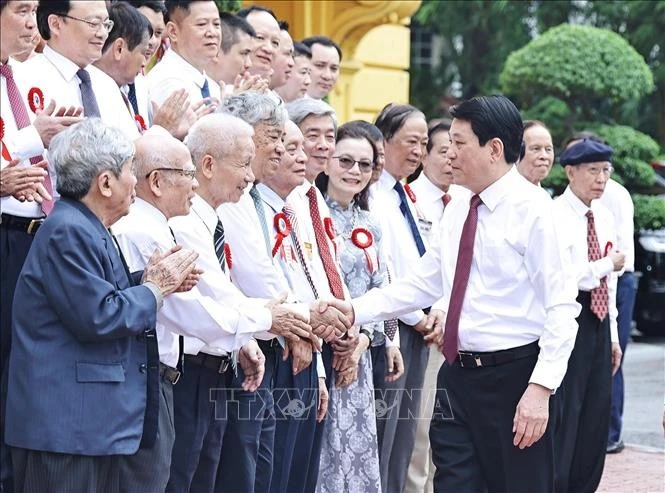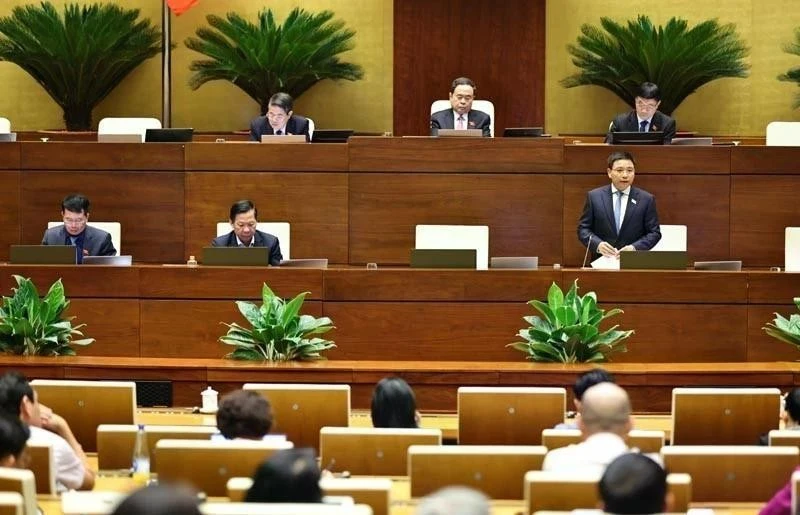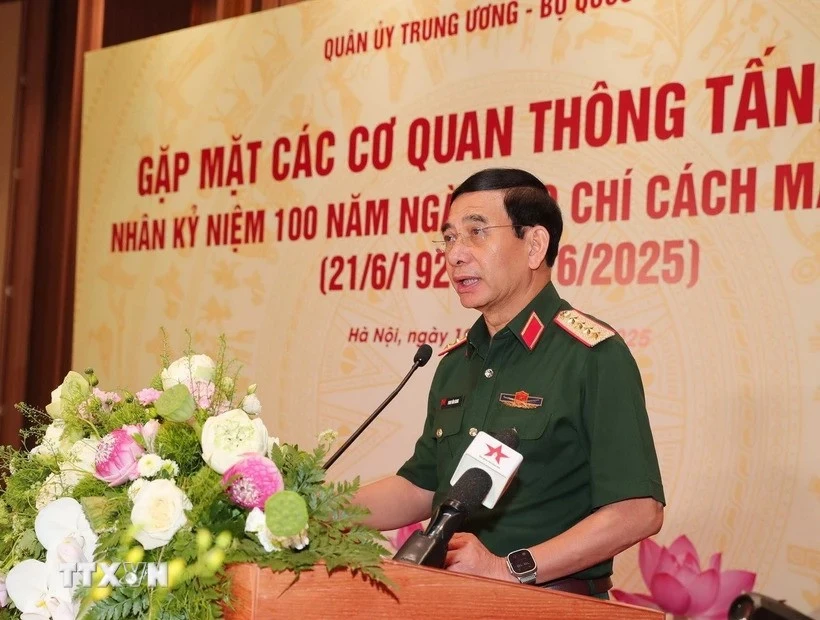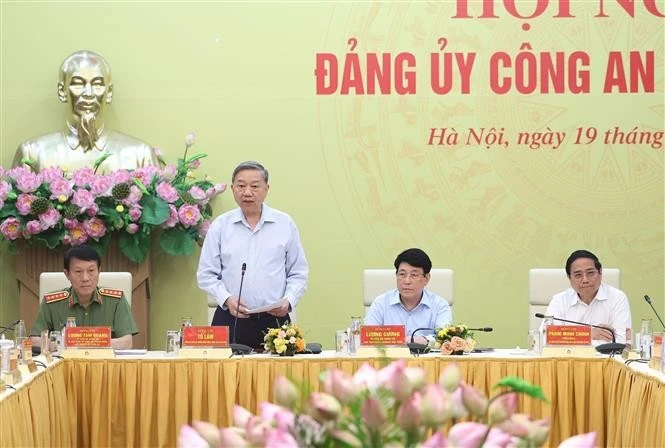A full century has passed since the publication of Vietnam’s first revolutionary newspaper - Thanh Nien, founded by leader Nguyen Ai Quoc, which released its inaugural issue on June 21, 1925. Since then, the Vietnamese revolutionary press has journeyed through history, carrying a sacred mission: Accompanying the nation, serving the Fatherland, and supporting the People. Vietnam’s revolutionary press as a whole - and Phu Yen’s journalism in particular - has continually grown in strength, remaining a pioneering force on the ideological and cultural front. It plays a vital role in informing the public, guiding social opinion, and inspiring patriotism, self-reliance, resilience, and the aspiration to develop the homeland and the country.
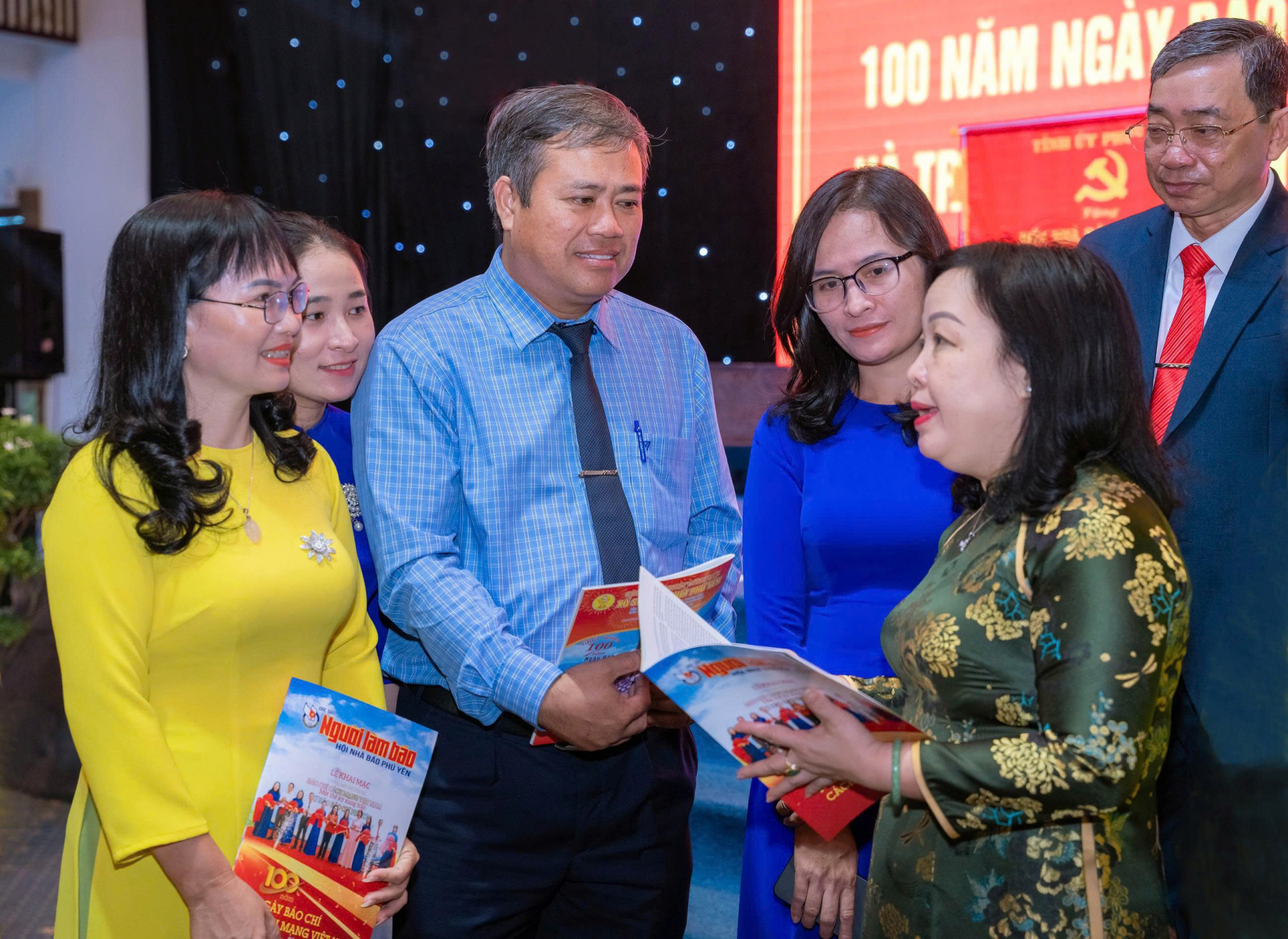 |
| Comrade Cao Thi Hoa An, Secretary of the Provincial Party Committee and Chairwoman of the Provincial People's Council, discussing work with journalists of Phu Yen at the celebration of the 100th Anniversary of the Vietnamese Revolutionary Press Day |
Press has been continuously growing in strength
On June 21, 1925, the official publication of the Vietnam Revolutionary Youth League - Thanh Nien Newspaper, founded by leader Nguyen Ai Quoc - released its first issue, laying the foundation for the birth of Vietnam’s revolutionary press. The launch of Thanh Nien played a crucial role in propagating revolutionary ideals, educating and preparing the political, ideological, spiritual, and organizational groundwork for the founding of the Communist Party of Vietnam in 1930. Since the inception of Thanh Nien, the Vietnamese press has carried high the banner of revolution, voicing the will and aspirations of the Vietnamese people, and charting the course of their struggle for independence, freedom, and socialism. President Ho Chi Minh was also the one who trained Vietnam’s first generation of proletarian journalists, including Le Hong Son, Ho Tung Mau, Le Duy Diem, Truong Van Linh, among others.
On February 5, 1985, the Secretariat of the Party Central Committee issued Decision No. 52-QĐ/TW, designating June 21 each year as Vietnam Revolutionary Press Day. The purpose was to enhance the political and cultural role and responsibility of the press, to strengthen the close bond between the press and the public, and to reinforce the Party’s leadership over press activities.
Alongside the glorious historical journey of Vietnam’s revolutionary press, generations of journalists have stood with the nation over the past century, making significant contributions to the cause of national liberation as well as to the country’s construction and defense. Throughout every stage of the revolution, our Party and State have consistently paid close attention to leading, guiding, and creating favorable conditions for the press to operate and grow, while also investing in the training and development of revolutionary journalists.
Currently, Vietnam's revolutionary press is constantly innovating, meeting the needs of fast and accurate information, playing an important role in orienting ideology and public opinion; actively propagating and disseminating the Party's guidelines, policies and laws of the State, reflecting the legitimate aspirations of all classes of the people; is one of the sharp tools and weapons to fight against the hostile forces of the revolution, fight against negativity, and protect the interests of the People. Simultaneously, the press promoted the image of Vietnam to friends around the world, contributing to improving Vietnam's position in the international arena.
Alongside the overall development of the national press, Phu Yen’s revolutionary journalism has steadily matured in all aspects. The appearance, quantity, and quality of press publications, as well as radio and television programs in the province, have been increasingly improved with a high degree of professionalism. The content published has become more diverse, timely, and engaging. Through this, the press has successfully discovered and highlighted new role models and exemplary individuals in society, while also showcasing achievements in the national renewal process - both across the country and within the province itself.
Phu Yen Province currently has 2 local press agencies, 2 journals, 1 information portal operated by the Provincial Party Committee, and one e-Government portal managed by the Provincial People’s Committee. The province is home to more than 160 staff members, including journalists, reporters, and editors. In addition to local media, there are 5 representative offices and 35 journalists from central press agencies and sector-specific media organizations who are registered and active in Phu Yen. The Phu Yen Journalists’ Association comprises 5 affiliated chapters and 2 clubs, with a total of 145 members.
Following in the footsteps of previous generations, today’s journalists in Phu Yen continue to uphold their pioneering role, undeterred by hardship and danger. They courageously venture to the frontlines, even in the most challenging and volatile areas to report on the protection of national sovereignty over seas and islands, and actively immerse themselves in real-life situations to provide timely coverage of issues and events of public concern. An increasing number of journalists are producing insightful, meaningful articles across various aspects of social life. Many journalistic works published in recent years have been timely, well-researched, of high quality, and have proposed practical solutions in key fields. These works have been honored with national press awards, as well as prestigious prizes in journalism on Party building, the fight against corruption, waste, and negativity, and on external communications...
Over the past years, the Party Committee and the government of Phu Yen province have consistently created favorable conditions and mechanisms to promote the development of the press, enabling it to fulfill its dual functions as the official voice of provincial agencies and as a forum for the People of the province.
Building a digital press, pioneering on the ideological and cultural front
The development of IT has opened up new, modern communication methods. To fulfill their political mission and achieve even greater accomplishments in the future, officials, journalists, and reporters in the province must continue to take a proactive role on the front lines in safeguarding the ideological foundation, guidelines, and policies of the Party, as well as the laws of the State. They need to actively engage in combating, critically analyzing, and publicly refuting incorrect and hostile viewpoints, especially false information circulating on the internet and social networks. Simultaneously, they should promptly identify and promote exemplary collectives and individuals who do good deeds, thereby helping to strengthen the trust of the People, the business community, and investors both within and outside the province.
The press is not only a tool for delivering information but also a foundation for spreading the core values of the nation, in line with the demands of the new era. Journalists are not merely messengers but also creators of trust, sources of inspiration, and pioneering fighters on the ideological and cultural front. They serve as a vital bridge between the government, the people, and businesses. Therefore, the journalism community must further uphold a strong sense of responsibility, continuously enhance their political integrity, and cultivate professional ethics. They should strive to be creative, proactively defend what is right, identify and promote new and progressive elements, and candidly combat social negativities - including those within journalism. Strict adherence to the 10 ethical regulations for journalists is essential. As President Hồ Chí Minh advised, journalists should “always strive to learn, always seek progress,” working with a passionate spirit guided by the motto of the late journalist Hữu Thọ: “a clear mind, a sharp pen, and a pure heart.”
Party committees, authorities, and localities need to pay greater attention to press activities, closely coordinate, and create favorable conditions for the press to operate. They should proactively provide information to media agencies in accordance with regulations, while also focusing on enhancing the effectiveness of state management over press work. Press agencies and the Provincial Journalists’ Association must continuously improve operational efficiency; accelerate digital transformation; and enhance the quality and interactivity of electronic newspapers to keep pace with the trend of multi-platform communication. The revolutionary press environment in the new era must be closely associated with digital transformation and the advancement of science and technology.
Building upon the glorious 100-year tradition of Vietnam’s revolutionary press, it is believed that today’s journalists in the province will continue the legacy of previous generations, always worthy of being pioneering and steadfast revolutionary fighters on the ideological and cultural front of the Party and the nation. They will play an important role in the country’s development and in building a richer, more beautiful, and civilized homeland.


